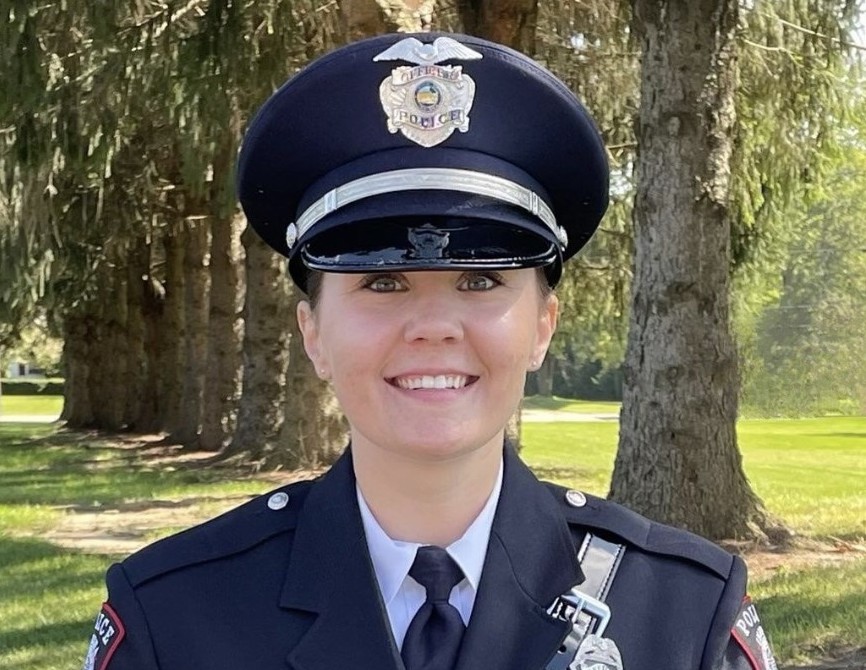Officer Hannah Skibba
Indiana University Police Department
Bloomington, Indiana

Q: Why did you become a police officer?
My journey to law enforcement was anything but traditional. I did not find my passion for policing until my second year of graduate school, where I was studying Student Affairs Administration in Higher Education. I knew I loved helping students navigate their college experience, but I did not feel challenged in the work I was doing. I did an internship with the university police department and quickly fell in love with the profession. I saw an opportunity to advocate for students, keep them safe, and serve as an educator and role model for young adults, a demographic that needs a lot of support and guidance. I knew that policing, specifically university law enforcement, was the perfect fit for me.
Q: What motivates you to succeed?
My two nieces, Lily and Lucy, motivate me to succeed. I know that they are watching my every move as they grow up and learn how to find their place in this crazy world. I am determined to show them that it is possible to achieve the goals that they set for themselves, even if others doubt them along the way. I want them to be resilient and strong women who have a positive influence on those around them. Lily, Lucy, and little girls everywhere motivate me to hold myself to a higher standard and keep working towards gender equality in male-dominated professions like law enforcement.
Q: What’s your most memorable moment on the job?
My most memorable moment on the job was during my time at the Indiana Law Enforcement Academy (ILEA). My class was one of the largest recruit classes ILEA had ever trained, graduating nearly 170 police officers. I walked in on the first day of the academy scared and nervous, but also with an overwhelming amount of relief. Relief that I was exactly where I needed to be. I pushed myself both mentally and physically over those 15 weeks of training, and I was honored to be selected by my peers as the Class President for class 219. I spoke at our academy graduation and seeing the look of pride on my parent’s faces is something that I will never forget.
Q: What challenges have you faced?
One of the most difficult challenges I face as a female in this profession is the constant pressure to prove myself to my male counterparts. I often feel that my actions are being looked at under a microscope or that my peers are waiting for me to make a mistake that could indicate that I am not physically or mentally capable of doing this job. I overcome these challenges by staying in shape, seeking new training opportunities, and taking on additional responsibilities that prove my loyalty to my agency.
Q: What advice do you have for women considering a profession in policing?
Take every opportunity to job shadow, do ride alongs, and interview current law enforcement professionals. Make sure you fully understand the responsibilities that you are taking on when you commit to a life of service. We need innovative, courageous, and strong females to bring their skills to this profession. Find a department that values your unique perspective as a female and make your voice heard. We are the future of policing, and we need you.
How we’re changing policing
The 30×30 Initiative is a coalition of police leaders, researchers, and professional organizations committed to advancing and supporting the representation, experiences, and well-being of women at all levels of law enforcement, both in the U.S. and beyond.
Research shows that women play a crucial role in building community trust, de-escalating conflict, and improving public safety outcomes, with evidence linked to reduced use of force and enhanced relationships with the communities they serve. However, women represent less than 14% of sworn officers and 20% of recruits in state and local law enforcement agencies. Additionally, about 40% of the approximately 18,000 law enforcement agencies in the U.S. have no full-time women officers (Source: Bureau of Justice Statistics).
We are collaborating with hundreds of agencies to make law enforcement a profession where qualified women who are drawn to it feel welcomed and supported while ensuring agencies address their unique needs and foster their success.